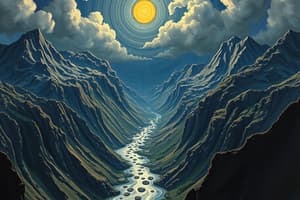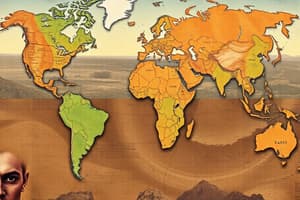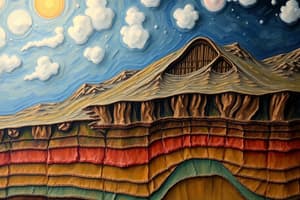Podcast
Questions and Answers
What is the characteristic of oceanic crust?
What is the characteristic of oceanic crust?
- Made largely of hard dense basalt (correct)
- Made largely of sial
- Made largely of sima
- Made largely of less dense granite
What is the process called when one plate moves beneath the other?
What is the process called when one plate moves beneath the other?
- Subduction (correct)
- Transformation
- Divergence
- Convection
What type of plate boundary is characterized by two plates colliding with each other?
What type of plate boundary is characterized by two plates colliding with each other?
- Transform boundary
- Conservative boundary
- Divergent boundary
- Convergent boundary (correct)
What is the name of the plate that includes the continent of Asia and Europe?
What is the name of the plate that includes the continent of Asia and Europe?
What is the rate at which plates move?
What is the rate at which plates move?
What is the feature associated with a subduction zone?
What is the feature associated with a subduction zone?
What type of crust is made largely of less dense granite?
What type of crust is made largely of less dense granite?
What is the name of the plate that includes the continent of Australia?
What is the name of the plate that includes the continent of Australia?
What is a limestone column that hangs down from the ceiling of a cave called?
What is a limestone column that hangs down from the ceiling of a cave called?
Which type of volcanoes are formed from viscous, sticky lava that does not flow easily?
Which type of volcanoes are formed from viscous, sticky lava that does not flow easily?
What is a large crater basin shaped depression that forms due to the collapse of the ground following a major eruption?
What is a large crater basin shaped depression that forms due to the collapse of the ground following a major eruption?
Which type of weathering is common in higher latitude areas of the world?
Which type of weathering is common in higher latitude areas of the world?
What is a volcano that has not erupted during historic time but will probably erupt again?
What is a volcano that has not erupted during historic time but will probably erupt again?
Which of the following is NOT true about strata volcanoes?
Which of the following is NOT true about strata volcanoes?
Which one of the following features is associated with a subduction zone?
Which one of the following features is associated with a subduction zone?
What is a common type of landform associated with the upper course of a river?
What is a common type of landform associated with the upper course of a river?
What type of plate boundary is characterized by plates sliding past each other?
What type of plate boundary is characterized by plates sliding past each other?
Which of the following layers of the Earth is liquid in nature?
Which of the following layers of the Earth is liquid in nature?
What is the name of the supercontinent that consisted of all of the present continents?
What is the name of the supercontinent that consisted of all of the present continents?
What happens to the crustal plates at a divergent plate margin?
What happens to the crustal plates at a divergent plate margin?
Fold mountains form when plates of the Earth's crust move:
Fold mountains form when plates of the Earth's crust move:
What drives the movement of plates?
What drives the movement of plates?
Where does plate subduction occur?
Where does plate subduction occur?
What happens at convergent plate boundaries where oceanic and continental crust meet?
What happens at convergent plate boundaries where oceanic and continental crust meet?
What is the primary controlling factor for mass wasting?
What is the primary controlling factor for mass wasting?
What is the term for the down slope movements of rock, regolith, and soil?
What is the term for the down slope movements of rock, regolith, and soil?
What is the result of two continental plates colliding?
What is the result of two continental plates colliding?
What is the term for an area of salt water separated from the sea by loose sand banks?
What is the term for an area of salt water separated from the sea by loose sand banks?
What is the effect of water on the materials that are prone to mass wasting?
What is the effect of water on the materials that are prone to mass wasting?
What is the term for a narrow ridge of sand that projects into the sea but is attached to the land at one end?
What is the term for a narrow ridge of sand that projects into the sea but is attached to the land at one end?
What is the effect of a steeper slope on the likelihood of mass wasting?
What is the effect of a steeper slope on the likelihood of mass wasting?
What is the term for a strip of land along the sea coast covered by varied types of sediments?
What is the term for a strip of land along the sea coast covered by varied types of sediments?
Which of the following agents of physical weathering is related to frost action?
Which of the following agents of physical weathering is related to frost action?
What is the major characteristic of the upper course of a river?
What is the major characteristic of the upper course of a river?
What is the process by which molten rock is forced out onto the surface of the earth?
What is the process by which molten rock is forced out onto the surface of the earth?
Which of the following pairs belongs to old fold mountains?
Which of the following pairs belongs to old fold mountains?
How is a block (horst) mountain formed?
How is a block (horst) mountain formed?
Which of the following is NOT an intrusive volcanic landform?
Which of the following is NOT an intrusive volcanic landform?
Which of the following is NOT related to endogenic forces?
Which of the following is NOT related to endogenic forces?
Which internal force is responsible for the formation of the Ethiopian rift valley?
Which internal force is responsible for the formation of the Ethiopian rift valley?
Flashcards are hidden until you start studying
Study Notes
Plate Tectonics
- The Earth's lithosphere is broken into large plates that move slowly at a rate of a few centimeters per year and change size.
- There are seven major large plates: Pacific, Antarctica, Euro-Asian, African, Indo-Australian, North American, and South American plates.
- Smaller plates include Nazca, Philippine, Caribbean, and Cocos plates.
Plate Movements and Boundaries
- Plates move in different directions and meet each other at plate boundaries.
- The movement of plates creates three types of tectonic plate boundaries: convergent, divergent, and transform boundaries.
- Continental crust is made of less dense granite (sial), while oceanic crust is made of hard dense basalt (sima).
- Convergent plate boundaries occur when two plates collide with each other, resulting in subduction, where the dense plate will be forced under the less dense one.
Convergent Boundaries
- Subduction occurs when one plate sinks underneath another, typically at oceanic-continental boundaries and oceanic-oceanic boundaries.
- Features associated with a subduction zone include volcanic arcs, island arcs, and trenches.
- There are three types of convergent boundaries: oceanic-continental, oceanic-oceanic, and continental-continental.
Mass Wasting (Movement)
- Mass wasting refers to the down-slope movement of rock, regolith, and soil under the influence of gravity.
- Factors that contribute to mass wasting include water, the angle of the slope, and human activities such as farming and overgrazing.
- Steeper slopes are more prone to mass wasting as the force of gravity is stronger on steeper gradients.
Landforms and Features
- Beach: a strip of land along the sea coast covered by varied types of sediments.
- Spit: a narrow ridge of sand that projects into the sea but is attached to the land at one end.
- Lagoon: an area of saltwater separated from the sea by loose sand banks.
- Fold mountains form when plates of the earth's crust move towards each other.
Volcanic Activity
- Volcanoes can be classified as active, dormant, or extinct based on their eruption history.
- A caldera is a large crater basin-shaped depression that forms due to the collapse of the ground following a major eruption.
- Shield volcanoes are formed from viscous, sticky lava that does not flow easily.
- Strata volcanoes are the most common volcanic form and are characterized by a steep profile and periodic, explosive eruptions.
Physical Weathering
- Frost action is a type of physical weathering that occurs in higher latitude areas of the world.
- Exfoliation is a type of physical weathering that occurs when rocks break apart due to temperature changes.
- Scree is a type of physical weathering that occurs when rocks break apart due to gravity.
Studying That Suits You
Use AI to generate personalized quizzes and flashcards to suit your learning preferences.




